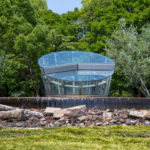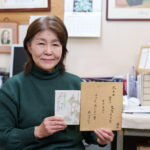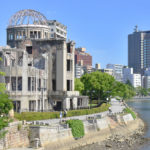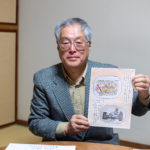An Interactive Online Forum to Talk to Atomic Bomb Survivors

Ever since its opening in July of 2017 near Peace Memorial Park, Social Book Cafe Hachidori-Sha has hosted an event called “Talk to an atomic bomb survivor on Days Ending in 6!” on the 6th, 16th, and 26th of every month. We interviewed ABIKO Erika, event organizer and owner of Hachidori-Sha.
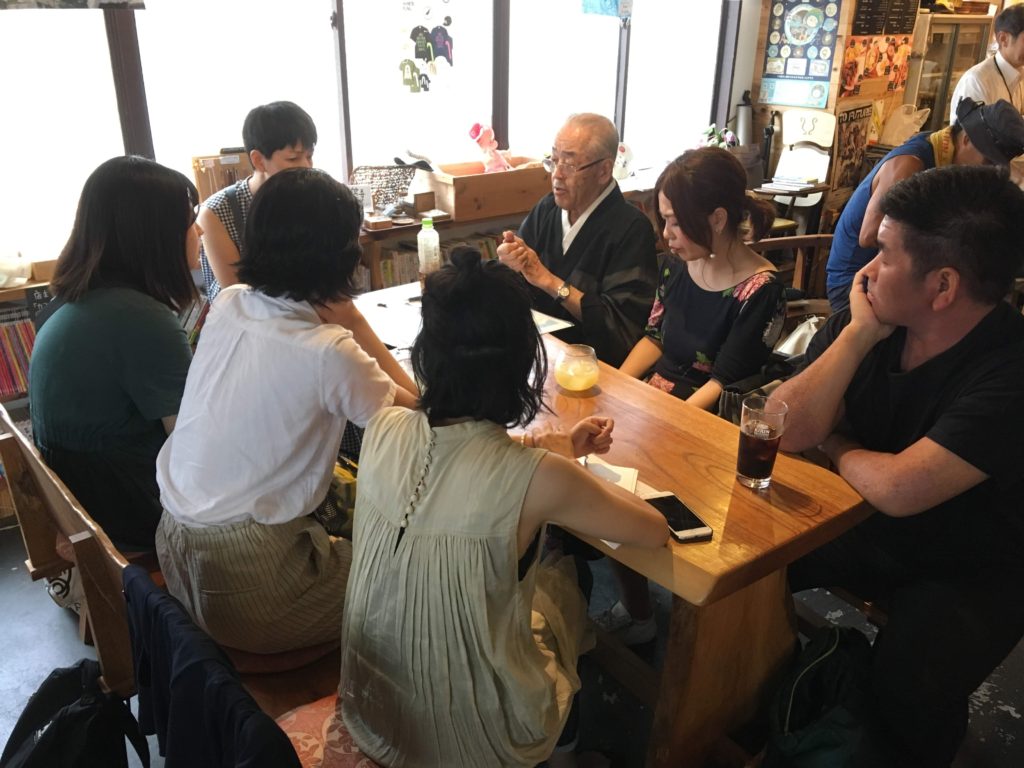
For the past three and a half years since Hachidori-Sha’s opening, many have shared their war stories and experiences in the atomic bombing at this event.
We didn’t want “Talk to an atomic bomb survivor on Days Ending in 6!” to be an event where participants simply listen to eyewitness accounts of the atomic bomb, but rather an interactive event where participants can talk about themselves and their opinions. Currently, the atomic bomb survivors giving their accounts are those who I met and became acquainted with while working on the Peace Boat*. Thinking of how the atomic bomb was dropped on my elderly friend, changes my own understanding of the war and of the atomic bomb and makes the atomic bomb feel less distant.
I’d been planning this event before the opening of Hachidori-Sha, which was opened to create a place to discuss social issues and interact with others, and held the first session on our opening day. I hope that those participating in these events do not see this as something that happened in the distant past, but as something that happened to the person speaking right before their eyes, to experience the continuation of history. And I hope they can also make friends.
Peace Boat is a boat tour organized by a Japanese NGO aimed at establishing international exchange. Peace Boat is involved in a wide range of efforts, such as the UPA project, which visits areas afflicted by poverty or natural disasters such as earthquakes and provides aid and supplies from Japan, and the Orizuru Project, in which the boat passengers ride with atomic bomb survivors from Hiroshima and Nagasaki to convey the importance of peace around the world.

On this day, the event is being held online. Abiko (right) and Seto (left) listen to a talk.
Before COVID-19, we had atomic bomb survivors and those who could talk about their experiences with the atomic bomb come to Hachidori-Sha from opening until evening, and when those who wished to participate arrived, we would sit them down and ask them to talk with the groups of people who had arrived at the same time. When foreign customers visit, staff member SETO Mayu interprets for them. So far, more than 1,400 people of all ages from all over the world have participated in this event.
I share with the atomic bomb survivors the same desire to prevent the use of nuclear weapons from ever being used against people again, and they share my interest and involvement in creating a place where they can tell their stories.
COVID-19 has made it difficult for the elderly to visit Hachidori-Sha, and so the event was switched to the online event by using the online conference service, Zoom, early on. During the period when COVID-19 subsided, the event was held simultaneously in person and online. Depending on the situation, an online-only event has also been held and this has continued until now.
I believe the most important thing going forward is ‘to continue.’ While there were many days when the number of participants dwindled due to COVID-19, we have never believed that lots of people attending is what makes an event good. If even just a single participant comes and is able to leave with something important, then I consider the event to be a great success. This venue is important, and I have people tell me that not only this event but other events have given them a place to be heard, which brings a sense of comfort, and so I hope to continue for a long time to come.
(Profile)
ABIKO Erika
Owner of Social Book Cafe Hachidori-Sha. She moved to Hiroshima after working aboard the Peace Boat. In July 2017, she opened Social Book Cafe Hachidori-Sha. In addition to working toward abolishing nuclear weapons, Hachidori-Sha places importance on providing a place to discuss social issues seriously, holding as many as 30 events per month.
SETO Mayu
A member of staff at Hachidori-Sha and a singer-songwriter. She is also a central member in “Kakuwaka Hiroshima” and the “GO! Treaty on the prohibition of nuclear weapons project,” organizations dedicated to the abolition of nuclear weapons. She serves as program facilitator and interpreter for the “Talk with a Storyteller on Days Ending in 6!” event.
Kakuwaka Hiroshima
https://kakuwakahiroshima.jimdofree.com (Only Japanese)
GO! Treaty on the prohibition of nuclear weapons project
https://www.susumeproject.com (Only Japanese)
Social Book Cafe Hachidori-Sha

Tel.: +81 (0) 82-576-4368
Address: 2-43-201 Dohashicho, Naka-ku, Hiroshima
Open: 3:00 PM – 6:30 PM (Wed – Fri), 11:00 AM – 6:30 PM (Weekends and Public Holidays)
Closed: Mon – Tue
*Open from 11:00 AM on days ending in 6 regardless of what day of the week it is (if it falls on a date that would normally be closed, the Wednesday of that week will be closed instead)
Website: http://hachidorisha.com/ (See here for event details)
To apply for the online session of “Talk with a Storyteller on Days Ending in 6!,” use the application form in the event calendar posted on the website above. Participation is free of charge)
Talk to an atomic bomb survivor on Days Ending in 6! Event Report

January 2021. We joined the completely online version of the event “Talk to an atomic bomb survivor on Days Ending in 6!”
Speaking this day was OKAMOTO Tadashi (76). After each of the participants introduced themselves, OKAMOTO spoke about his experience with the atomic bomb using slides on Zoom. OKAMOTO, who was exposed to the atomic bomb when he was one and a half years old, had no memory of the bombing and spoke based on records and documents of the experience left by his uncle.
OKAMOTO has recently started presenting the scars on his arm from the atomic bombing, including photographs. Though he has no memory of the event, the scars are still visible 75 years later.
Participants commented that, while they were felt compelled to spread information about the atomic bombing, they were unsure whether they should do so. OKAMOTO responded, “If it is something you have researched properly yourself, then by all means do it,” an answer that left quite an impression.
At the end of the event, Hachidori-Sha staff member SETO said, “I’m glad participants say that they wanted to do something after hearing these stories.”
Some young people who participated in this event previously have begun helping with the “Kakuwaka Hiroshima” and “GO! Treaty on the prohibition of nuclear weapons project,” which Abiko and Seto are involved in. I felt that “Talk to an atomic bomb survivor on Days Ending in 6!” was helping to spread Hachidori-Sha’s mission.
Peace Learning
Kakuwaka, a Group of Young People Thinking About Nuclear Weapons
Appearing in this article is Kakuwaka, a group aimed at abolishing nuclear weapons. This organization is working on measures in countries around the globe to help create a world without nuclear weapons. We asked representative TANAKA Miho about the organization's activities.
Kakuwaka, a Group of Young People Thinking About Nuclear WeaponsHachidori-Sha From the Standpoint of SDGs
Hachidori-Sha's work was presented in Companies Working Toward SDGs: SDGs and the Future of Business--Efforts at Companies in Hiroshima.
Hachidori-Sha From the Standpoint of SDGsTags associated with this article



